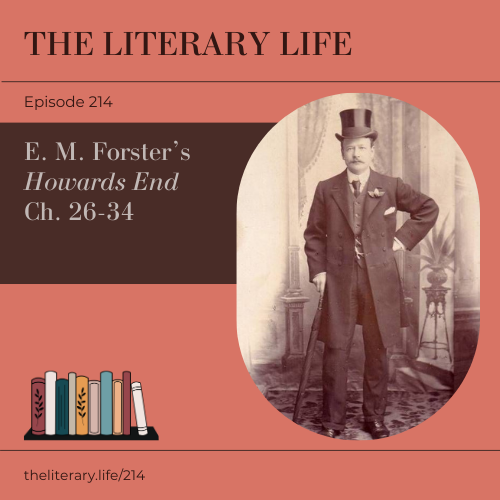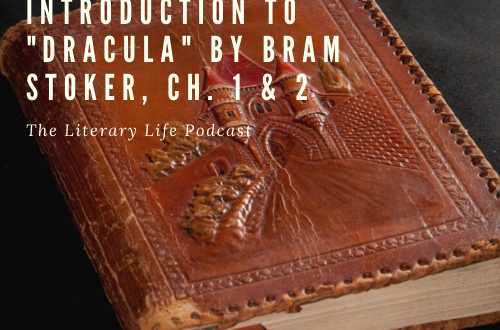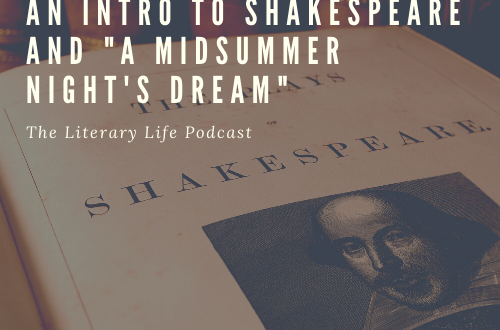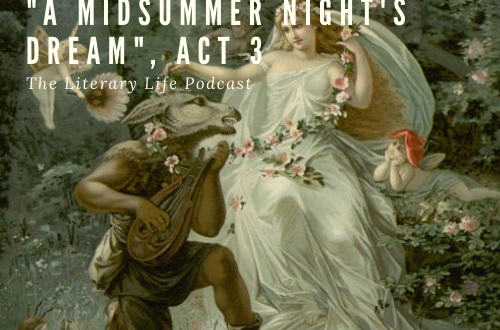
Episode 214: E. M. Forster’s “Howards End,” Ch. 26-34
Welcome back to The Literary Life Podcast and our series discussing Howards End by E. M. Forster. This week Angelina Stanford and Thomas Banks cover chapters 26-34. Together they continue to talk about the ideas Forster is presenting in the book as seen in this section, including Howards End as a character, the echoes of Wind in the Willows (thanks to Jen Rogers!), Helen’s idealism, Margaret and Henry’s conflict, the idea of rootedness, and more.
On March 7, 2024 you can join Thomas and his brother James live for a webinar on King Alfred the Great. Register today at houseofhumaneletters.com. The webinar recording will also be available for lifetime access after that date.
We hope you will join us for the sixth annual Literary Life Online Conference, “Dispelling the Myth of Modernity: A Recovery of the Medieval Imagination.” During the live or later series of webinars, we will seek to dis-spell the Myth of Modernity and gain eyes to see and ears to hear Reality as it truly is. Speakers include Jason Baxter, Jenn Rogers, and Kelly Cumbee, in addition to Angelina and Thomas.
If you want to get the special literary themed teas created by our Patron Erin Miller, go to adagiotea.com to check them out!
Listen to The Literary Life:
Commonplace Quotes:
Everything has been said already; but since nobody was listening, we shall have to begin all over again.
Toutes choses sont dites déjà; mais comme personne n’écoute, il faut toujours recommencer.
Andre Gide, from “Narcissus”
It is under these “present conditions” of materialism, urbanization, and cosmopolitanism that Howards End poses the question, “Who shall inherit England?” This question is given a lyrical resonance shortly after Margaret tells Helen of her intention to marry Henry. The two women, visiting Aunt Julie at Swanage, gaze across Poole Harbor and watch the tide return. “England was alive, throbbing through all her estuaries, crying for joy through the mouths of all her gulls, and the north wind, with contrary motion, blew stronger against her rising sea,” the narrator records, and then asks: “What did it mean? For what end are her fair complexities, her change of soil, her sinuous coast? Does she belong to those who have moulded her and made her feared by other lands, or to those who had added nothing to her power, but have somehow seen her, seen the whole island at once, lying as a jewel in a silver sea, sailing as a ship of souls, with all the brave world’s fleet accompanying her towards eternity?” These questions are at the heart of the book. More crudely stated, they ask whether England belongs to the imperialist or to the yeoman, to those who see life steadily or to those who see it whole, to the prosaic or to the poet. Put another way, they ask whether the inheritors of England are to be people of action or vision.
Claude J. Summer, from “E. M. Foster”
To E. M. Forster
By W. H. Auden
Here, though the bombs are real and dangerous, And Italy and Kings are far away, And we're afraid that you will speak to us, You promise still the inner life shall pay. As we run down the slope of Hate with gladness You trip us up like an unnoticed stone, And just as we are closeted with Madness You interrupt us like the telephone. For we are Lucy, Turton, Phillip, we Wish international evil, are excited To join the jolly ranks of the benighted Where Reason is denied and Love ignored: But, as we swear our lie, Miss Avery Comes out into the garden with the sword.
Book List:
Support The Literary Life:
Become a patron of The Literary Life podcast as part of the “Friends and Fellows Community” on Patreon, and get some amazing bonus content! Thanks for your support!
Connect with Us:
You can find Angelina and Thomas at HouseofHumaneLetters.com, on Instagram @angelinastanford, and on Facebook at www.facebook.com/ANGStanford/
Follow The Literary Life on Instagram, and jump into our private Facebook group, The Literary Life Discussion Group, and let’s get the book talk going! http://bit.ly/literarylifeFB
Subscribe to The Lit Life:









One Comment
Jennie Brandon
Quick footnotes for this episode from a Cambridge girl, born and bred!
You can’t apply to Cambridge and Oxford in the same year. I think that’s always been the case (I worked in admissions at Cambridge)
A good Cambridge girl I was taught to call Oxford “the other place”. The rivalry is both tongue in cheek and deadly serious ?
A lay reader is a position in the church of England/Anglican
church. They may also have them in the Methodist Church but it’s almost certainly Anglican
The City (capital C) is the financial district, like Wall Street,where you now see all the skyscrapers. So working in the City means you work in finance. They even have their own tube stop called City.
Middle class, even today, means something different there in the UK than it does in the States. It has little to do with income but probably means you’re a graduate and in the professions or at least in middle management. But it also means a certain attitude to culture and education which is why it’s hard to move between classes, even if you change your income. The class system is still alive and kicking here, whether we like it or not. People will read a lot into your accent and things like that as it often signifies as much about your class as your region. (I’m not defending this but it’s there). Working class usually means blue collar workers or can be office workers without degrees. That’s why Leonard Vass sticks out for reading. Upper class isn’t just aristocracy any more but almost always aristocracy adjacent.
There, that feels better. Sorry!